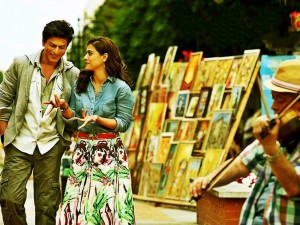 Review: Limited Run
Review: Limited Run
Dilwale | Rohit Shetty | India | 2015 | 158 minutes
Now playing at AMC Fitchburg 18 through Thursday, December 24»
Shah Rukh Khan and Kajol prove that they can still generate screen chemistry and magic in Dilwale, but the film as a whole is a series of missed opportunities bogged down by violence and far less interesting younger co-stars.
Those who have followed the Bollywood trades know that a showdown between two year-end blockbusters, Dilwale and Bajirao Mastani has been brewing since their shared global release date, December 18, was announced. Despite the demand for screens for Star Wars: The Force Awakens on the same day, both films have opened in the Madison market at AMC Fitchburg 18. Given the choice between the two, I opted to start with Dilwale, which reunites Shah Rukh Khan with Kajol, his co-star in the film that made them both stars, Dilwale Dulhania Le Jayenge (1995).
While SRK and Kajol prove that they have more screen charisma and chemistry than their younger model-cutout co-stars, Dilwale unfortunately generates conflicting feelings by directly and indirectly reminding us of their earlier work. The wild mix of tones, which often works in a masala melodrama, here forces the stars to shift gears too often and too abruptly. This becomes frustrating when scenes that work beautifully are abandoned for scenes that seem forced and contrived.
Dilwale begins with a surprisingly violent (and loud) title sequence, which we eventually realize is a flashback to mysterious events that took place 15 years earlier. In the present day, Raj (Shah Rukh Khan) wakes up from these violent memories to begin his workday at the auto customization shop he runs with his younger brother, Veer (Varun Dhawan). While delivering a newly customized car, Veer comes to the rescue of young, tall, and pretty Ishita (Kriti Sanon), who needs a ride when her scooter breaks down. Much of the first act of Dilwale focuses on Veer and Ishita and their young circle of friends. In fact, the first major number, “Manma Emotion Jaage,” is a vehicle for Dhawan and Sanon, with SRK out of the picture.
We soon discover that Raj started his auto shop to escape a violent past. Fifteen years earlier he was known by his real name, Kaali, the eldest son in one of two rival Indian mafia families in Bulgaria (you know, that old saw). In the middle of a battle between the families, Kaali accidentally hits a young artist, Meera (Kajol), with his car. Her injuries are minor, but when he contacts her again a romance begins. In a charming sequence, Kaali and Meera have an elaborately choreographed “five minute date,” shot in a single long take. The date turns out to be on the eve of both Meera’s birthday and a particularly dangerous mission for Kaali. He promises her that he will return for the evening of her birthday, but since she is not in the picture in the present day we suspect that something will go horribly wrong.
The remainder of the film traces the parallels and coincidental connections between the Kaali/Meera and Veer/Ishita romances. But undermining both is a surprising level of screen violence that requires Khan and Kajol to alternate between being hopeless romantics and ruthless bad-asses. When they’re the former, Dilwale occasionally soars; when they’re the latter, the film often falls flat.
The violence could have provided an interesting counterpoint to the romance, and even enhanced it by going in a direction that would have genuinely surprised me. But instead the violence is pretty generic, and sometimes poorly executed. The sound design during several fights is particularly poor. Rapid punches sound like the same effect on a loop.
A crucial obstacle for Dilwale is that Khan and Kajol are far more interesting to watch than Dhawan and Sanon, and we quickly miss the older stars whenever the younger stars dominate the screen time. The more problematic gap is between Kajol and Sanon. Kajol lights up the screen; Sanon (in a far less intriguing and sometimes thankless role) simply decorates the screen.
Perhaps the most interesting, but misguided, stylistic decision in Dilwale is to use music cues that remind the viewer of Khan and Kajol’s previous work. Instrumentation in both “Guera” and “Janam Janam” reminded me of ukuleles DDLJ, and many fans have suggested that the sequence for “Guera” seems to be an update to the sequence for “Suraj Hua Maddham” from Karan Johar’s Kabhi Khushi Kabhie Gham (2001). I love post-modern callbacks as much as the next guy, but perhaps a better strategy here would have been to create new vivid screen moments rather than to remind us of the ones that we already cherish.
Dilwale is never terrible (contrary to reviews titled, “This Movie Sucks, And We’re All To Blame For Its Existence”) and even in its weakest moments it remains entertaining. But one wonders what SRK envisions for his career with his production company, Red Chilles. Om Shanti Om remains his best for Red Chilles, followed by last year’s fun but featherweight Happy New Year. Fans had to wait a full year between Happy New Year and Dilwale, his only major film role in 2015. With Happy New Year and Dilwale he seems content in moving towards ensemble casts, but I’m not sure if anyone wanted a SRK/Kajol romance with so many distractions.
Turnout for the Dilwale screening I attended was strong—one couple had difficulty finding seats next to each other as they arrived shortly before showtime. On Tuesday, I’ll see how Dilwale matches up with Bajirao Mastani for our Madfilm Meetup.